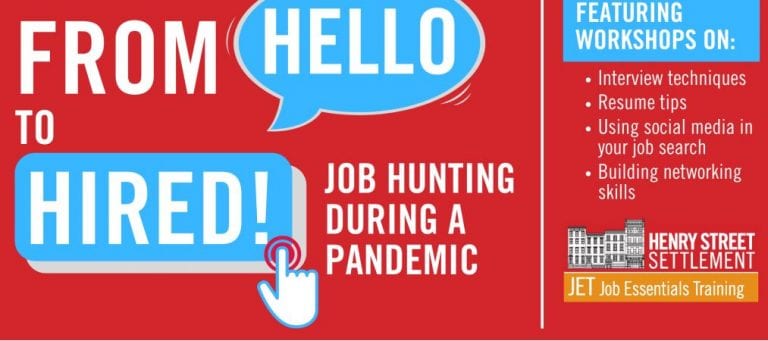Serving the Lower East Side for 127 years and counting, Henry Street Settlement is a historic and critical institution providing opportunity and assistance to New Yorkers through over 50 programs for people of all ages ranging from employment and social services to arts and healthcare supports. Serving a wide range of job-hunters, including immigrants,, youth, and public housing residents, its Workforce Development Center offers a wide range of services including ESOL and HSE classes, the Summer Youth Employment Program, computer skills training, employment assistance and more.
As a neighborhood anchor institution, Henry Street pivoted dramatically over the past eight months to serve emergent and profound community needs. Its Helpline, launched in April, has responded to nearly 1,200 calls, assisting New Yorkers with any situation they need help with such as unemployment insurance, SNAP benefits, and other financial resources; emergency cash assistance; remote-learning tools for their children; ESOL classes; and COVID testing sites. The most common challenge that callers have faced is consistent access to food, with 90% of Helpline callers experiencing food insecurity. Henry Street has met this profound need by launching an emergency food initiative, opening three new food pantries, expanding its Meals on Wheels program and securing funding for emergency cash funds. Over the last eight months, the agency has provided over 500,000 meals to its neighbors and continues to distribute 12,000 meals per week.
With regard to workforce programs, Henry Street successfully moved programs like ESOL, HSE, job-readiness, and job-placement programs online. One program that has remained particularly active throughout the pandemic has been Jobs Plus, serving residents of the Jacob Riis II and Lillian Wald Houses. At the start of the pandemic, the program redeployed its staff to parts of the Settlement in urgent need of labor, including distributing food to shelter residents and through Meals on Wheels. As a response to technology needs among NYCHA residents, the team also distributed 35 laptop computers to jobseekers and those enrolled in HSE and job-certification programs. Team members also distributed PPE and organized a well-attended Open Street jobs fair, all the while maintaining the range of services it has always provided, including job placement, financial education, and other wraparound services for community members.
To a large extent, the organization has shifted the types of industry where it is able to place workers to reflect the labor market shifts during the pandemic. For example, many more individuals have found employment in maintenance jobs as the demand for these essential workers has skyrocketed in the face of COVID regulations and requirements. As in the past, there continues to be significant cross-agency integration, for example with ESOL students or residents of transitional housing residences referred for job placement services. Since the beginning of the pandemic, the Workforce Development Center has connected 119 clients to jobs, held 16 in-person and virtual employer events, held numerous online workshops through its Job Essentials Training (JET) program, and continues to run four ESOL classes and three HSE classes daily. The agency also successfully advocated for a restoration of summer youth job funding when the city SYEP budget was cut, and–with additional private fundraising–managed to place 475 youth in summer jobs. One component of this youth employment program was the Community Covid Response Team, a group of young adults who got work experience and income while responding to their own community’s needs during the pandemic, by distributing PPE, helping older adults with their technology issues, and providing community outreach over the summer and beyond. The CCRT has become an ongoing youth employment program.
The biggest workforce challenge has been the abrupt change in the labor market, with instability among industries such as hospitality and retail that Henry Street had connected many of its clients to.. Large numbers of Henry Street clients have been laid off from their jobs, including many undocumented workers. That has led to a wide variety of needs, with the most immediate being the demand for emergency cash and food. Henry Street’s Helpline has been instrumental in meeting these needs.The organization also aims to address clients’ and staff members’ concerns about working onsite and having confidence in the safety precautions put in place.
As with many community-based organizations within NYCETC’s membership, clients’ lack of access to technology has made connecting with them and providing services more difficult. An April analysis of workforce providers across the city found that workforce organizations’ ability to support New Yorkers remotely during the pandemic in equitable and inclusive ways is hampered by the high rates of digital disconnection experienced by clients. Across the system, 13% of clients do not have a device and/or an internet connection; among small and mid-size organizations, which usually support more vulnerable populations with higher barriers to employment, the digital disconnection rate increases to 36%.
This digital disconnection further accentuates the lack of human connection that underlies the pandemic, which is particularly difficult for organizations like Henry Street, whose success is rooted in building nurturing communities that support and empower people in a holistic and integrated manner. To that end, Henry Street has made considerable effort to support workforce staff in finding new ways to motivate and support New Yorkers, including offering webinars in engaging clients online and providing laptops, conferencing software, and IT support to any staff who need them in their home offices. Henry Street has also provided considerable emotional support to those struggling with the challenges of working with clients remotely and dealing with their own fears and anxiety about the current crisis, including expanded employee mental health counseling.


